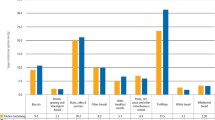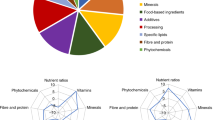Abstract
Background/Objectives:
Few studies have examined consumer acceptability or comprehension of cholesterol-lowering claims on food labels. Our objective was to assess consumer attitudes and understanding of cholesterol-lowering claims regarding plant sterols (PS) and oat fibre (OF).
Subjects/Methods:
We conducted two studies on: (1) PS claims and (2) OF claims. Both studies involved a randomized mock-packaged experiment within an online survey administered to Canadian consumers. In the PS study (n=721), we tested three PS-related claims (disease risk reduction claim, function claim and nutrient content claim) and a ‘tastes great’ claim (control) on identical margarine containers. Similarly, in the OF study (n=710), we tested three claims related to OF and a ‘taste great’ claim on identical cereal boxes. In both studies, participants answered the same set of questions on attitudes and understanding of claims after seeing each mock package.
Results:
All claims that mentioned either PS or OF resulted in more positive attitudes than the taste control claim (P<0.0001), despite all products within each study having the same nutrition profile. How consumers responded to the nutrition claims between the two studies was influenced by contextual factors such as familiarity with the functional food/component and the food product that carried the claim.
Conclusions:
Permitted nutrition claims are approved based on physiological evidence and are allowed on any food product as long as it meets the associated nutrient criteria. However, it is difficult to generalize attitudes and understanding of claims when they are so highly dependent on contextual factors.
This is a preview of subscription content, access via your institution
Access options
Subscribe to this journal
Receive 12 print issues and online access
$259.00 per year
only $21.58 per issue
Buy this article
- Purchase on Springer Link
- Instant access to full article PDF
Prices may be subject to local taxes which are calculated during checkout


Similar content being viewed by others
References
Statistics Canada Leading causes of death in Canada. Available at: http://www5.statcan.gc.ca/bsolc/olc-cel/olc-cel?catno=84-215-X&lang=eng.
Genest J, McPherson R, Frohlich J, Anderson T, Campbell N, Carpentier A et al. Canadian Cardiovascular Society/Canadian guidelines for the diagnosis and treatment of dyslipidemia and prevention of cardiovascular disease in the adult - 2009 recommendations. Can J Cardiol 2009; 25: 567–579.
Flesher M, Kinloch K, Grenon E, Coleman J . Access to dietitians in primary health care. Can J Diet Pract Res 2011; 72: 32–36.
Canadian Council of Food and Nutrition. Tracking Nutrition Trends VII. Canadian Council of Food and Nutrition: Mississauga, ON, Canada, 2008.
Codex Alimentarius Guidelines for the Use of Nutrition and Health Claims (CAC/GL 23-1997). 2013. Available at: http://www.codexalimentarius.org/download/standards/351/CXG_023e.pdf (accessed 02/04 2014).
Government of Canada. Regulations Amending the Food and Drugs Regulations (Nutrition Labelling, Nutrient Content Claims and Health Claims). The Canada Gazette, Part II 2003, 137: 154.
European Parliament and Council. Regulation (EC) No 1924/2006 of the European Parliament and of the Council of 20 December 2006 on nutrition and health claims made on foods. Official Journal of the European Union 2006, L404: 9.
Health Canada Summary of assessment of a health claim about oat products and blood cholesterol lowering. 2010. Summary of assessment of a health claim about oat products and blood cholesterol lowering. 2010. Available at: http://www.hc-sc.gc.ca/fn-an/label-etiquet/claims-reclam/assess-evalu/oat-avoine-eng.php (accessed 26 June 2011).
Health Canada Summary of assessment of a health claim about plant sterols in foods and blood cholesterol lowering. 2010. Available at: http://www.hc-sc.gc.ca/fn-an/alt_formats/pdf/label-etiquet/claims-reclam/assess-evalu/phytosterols-claim-allegation-eng.pdf (accessed 26 June 2011).
European Commission EU register of nutrition and health claims made on foods. 2013. Available at: http://ec.europa.eu/nuhclaims/ (accessed 08 January 2013).
Wansink B, Cheney MM . Leveraging FDA Health Claims. J Consumer Aff 2005; 39: 386–398.
Williams P . Consumer understanding and use of health claims for foods. Nutr Rev 2005; 63: 256–264.
Urala N, Arvola A, Lähteenmäki L . Strength of health-related claims and their perceived advantage. Int J Food Sci Tech 2003; 38: 815–826.
Wong CL, Arcand J, Mendoza J, Henson SJ, Qi Y, Lou W et al. Consumer attitudes and understanding of low sodium claims on food: An analysis of healthy and hypertensive individuals. Am J Clin Nutr 2013; 97: 1288–1298.
Arcand J, Mendoza J, Qi Y, Henson S, Lou W, L'Abbé MR . Results of a national survey examining Canadians' concern, actions, barriers, and support for dietary sodium reduction interventions. Can J Cardiol 2013; 29: 628–631.
Emrich TE, Qi Y, Mendoza JE, Lou W, Cohen JE, L'Abbé MR . Consumer perceptions of the Nutrition Facts table and front-of-pack nutrition rating systems. Appl Physiol Nutr Metab 2014; 39: 417–424.
Verbeke W, Scholderer J, Lahteenmaki L . Consumer appeal of nutrition and health claims in three existing product concepts. Appetite 2009; 52: 684–692.
Schermel A, Emrich TE, Arcand J, Wong CL, L'abbe MR . Nutrition marketing on processed food packages in Canada: 2010 Food Label Information Program. Appl Physiol Nutr Metab 2013; 38: 666–672.
Braun V, Clarke V . Using thematic analysis in psychology. Qual Res Psychol 2006; 3: 77–101.
van Trijp HC, van der Lans IA . Consumer perceptions of nutrition and health claims. Appetite 2007; 48: 305–324.
U.S. Food and Drug Administration. Electronic Code of Federal Regulations, Title 21: Food and Drugs, PART 101—Food Labeling, Subpart E: Specific Requirements for Health Claims § 101.83 Health claims: plant sterol/stanol esters and risk of coronary heart disease (CHD). 2005. Available at: http://www.ecfr.gov/cgi-bin/text-idx?c=ecfr;sid=502078d8634923edc695b394a357d189;rgn=div8;view=text;node=21%3A2.0.1.1.2.5.1.14;idno=21;cc=ecfr (accessed 11 December 2012).
Thompson GR, Grundy SM . History and development of plant sterol and stanol esters for cholesterol-lowering purposes. Am J Cardiol 2005; 96: 3D–9D.
Saba A, Vassallo M, Shepherd R, Lampila P, Arvola A, Dean M et al. Country-wise differences in perception of health-related messages in cereal-based food products. Food Qual Prefer 2010; 21: 385–393.
Tudoran A, Olsen SO, Dopico DC . The effect of health benefit information on consumers health value, attitudes and intentions. Appetite 2009; 52: 568–579.
van Kleef E, van Trijp HC, Luning P . Functional foods: health claim-food product compatibility and the impact of health claim framing on consumer evaluation. Appetite 2005; 44: 299–308.
Acknowledgements
This study was supported by the National Centres of Excellence, Advanced Foods and Materials Network (MRL and SJH), an Earle W McHenry Research Chair (University of Toronto) unrestricted research grant ‘Food and Nutrition Policy for Population Health’ (MRL), an Ontario Graduate Scholarship (CLW) and two Canadian Institutes of Health Research Strategic Training Grants in (1) Public Healthy Policy (CLW) and (2) Population Interventions for Chronic Disease Prevention: A Pan-Canadian Program (grant 53893; CLW).
Author information
Authors and Affiliations
Corresponding author
Ethics declarations
Competing interests
The authors declare no conflict of interest.
Rights and permissions
About this article
Cite this article
Wong, C., Mendoza, J., Henson, S. et al. Consumer attitudes and understanding of cholesterol-lowering claims on food: randomize mock-package experiments with plant sterol and oat fibre claims. Eur J Clin Nutr 68, 946–952 (2014). https://doi.org/10.1038/ejcn.2014.107
Received:
Revised:
Accepted:
Published:
Issue Date:
DOI: https://doi.org/10.1038/ejcn.2014.107



